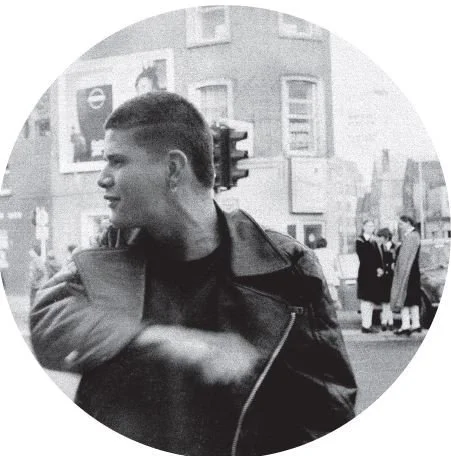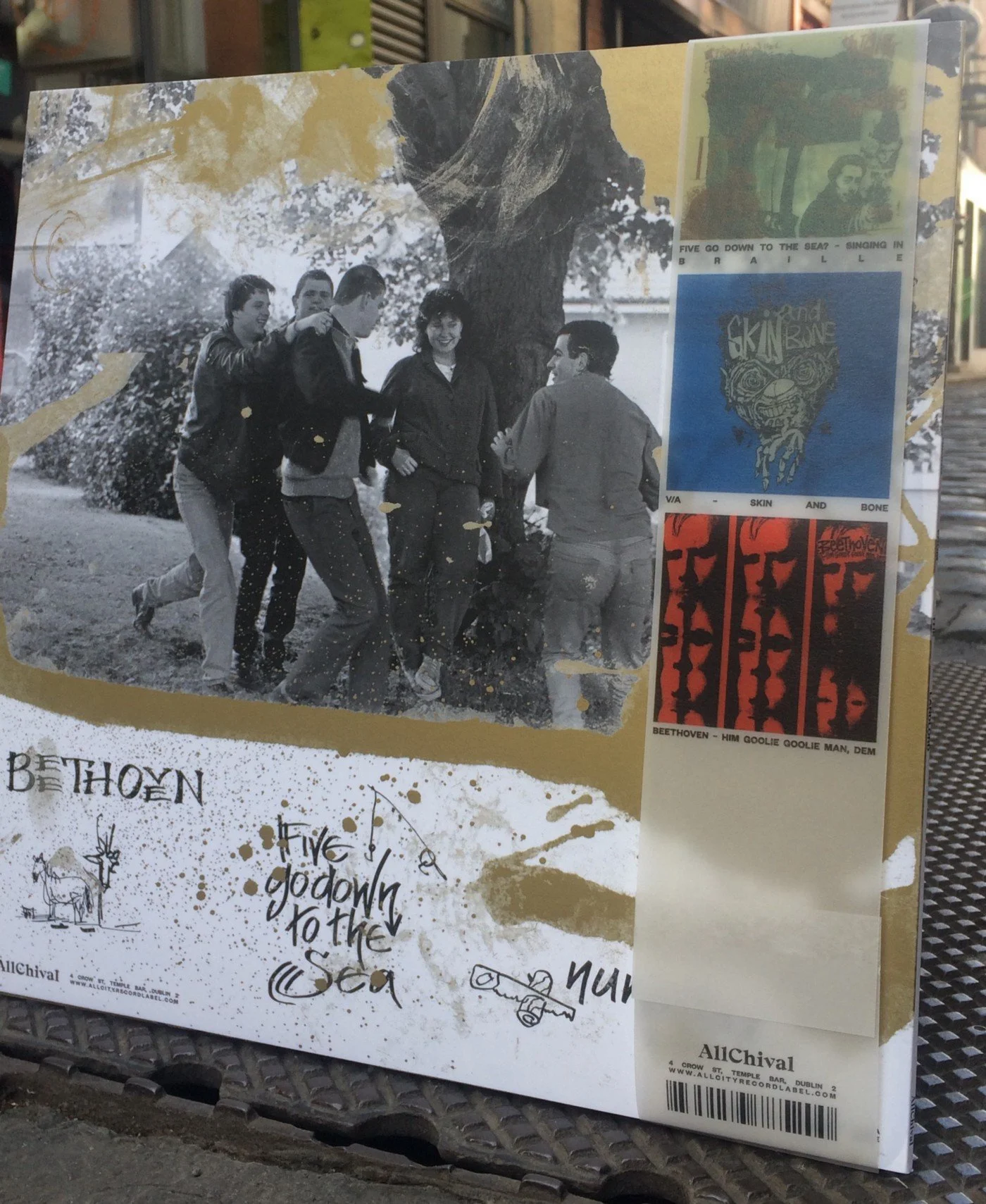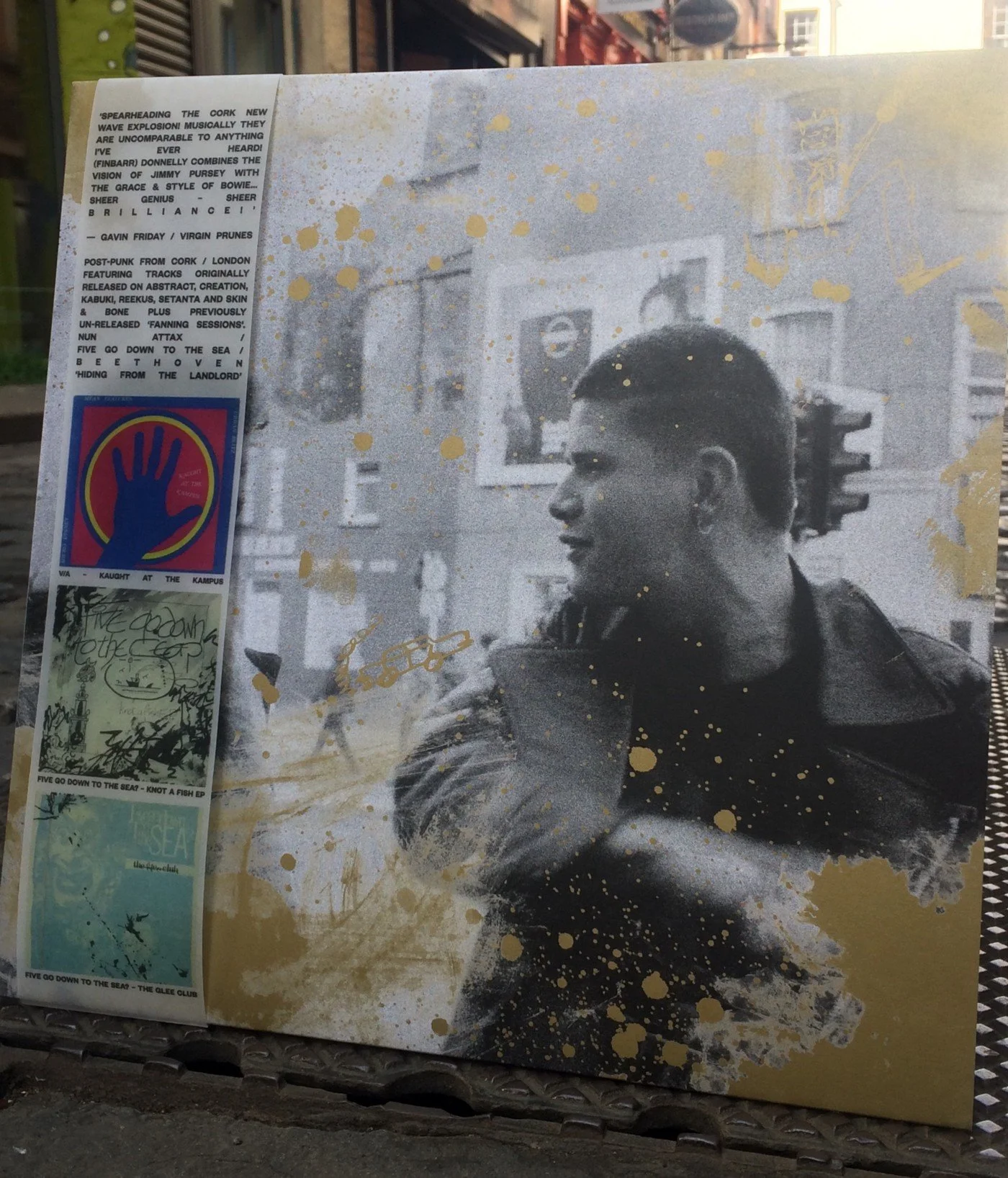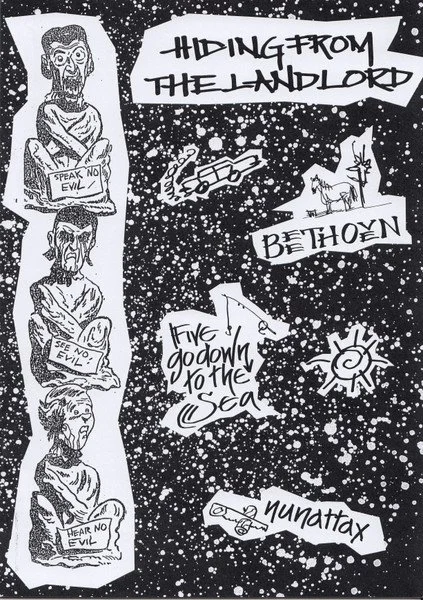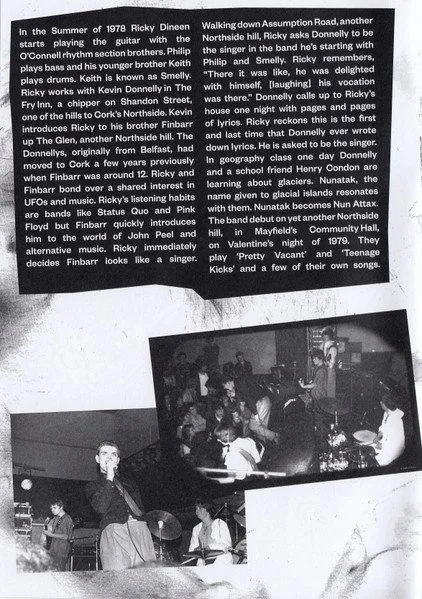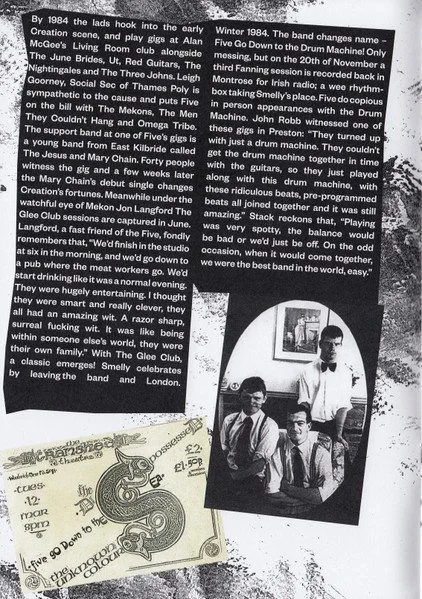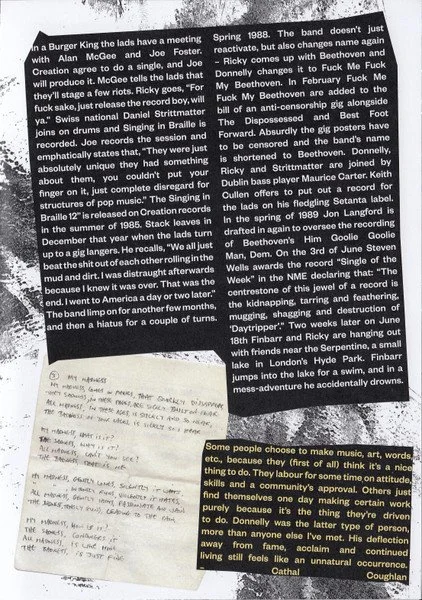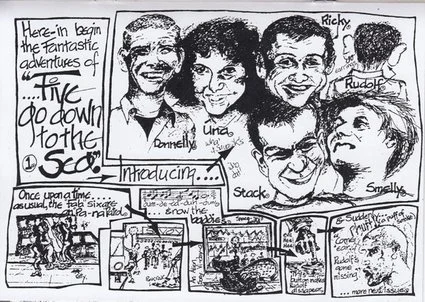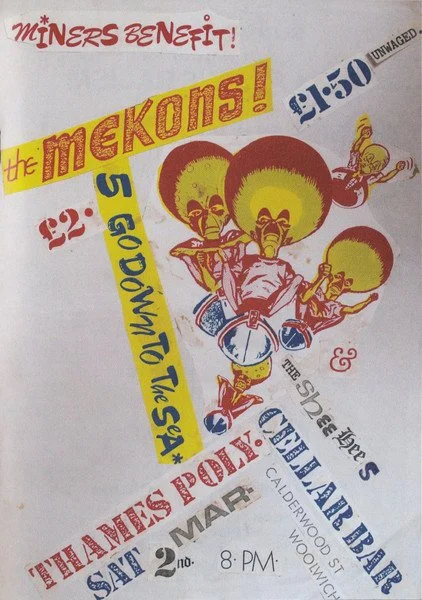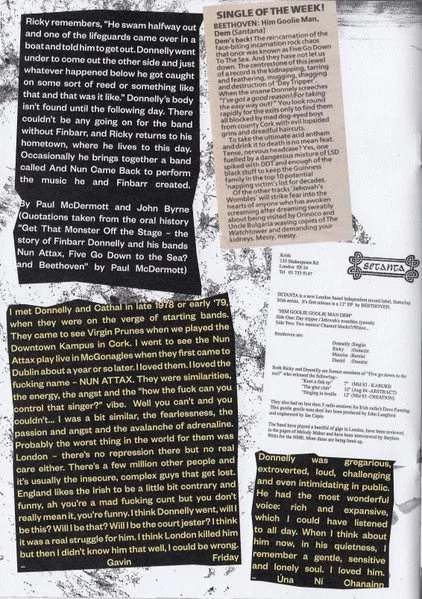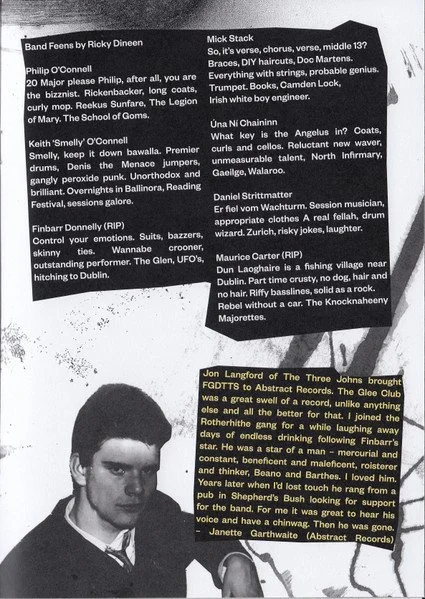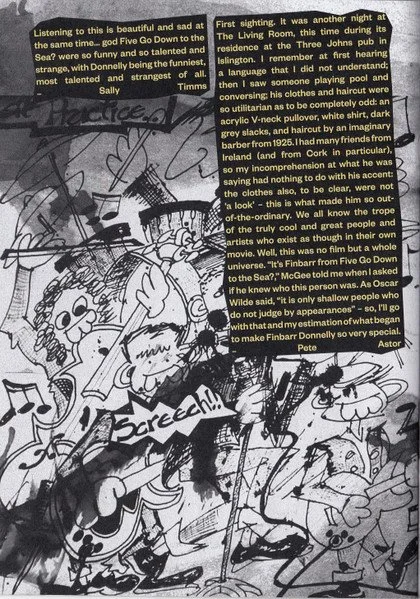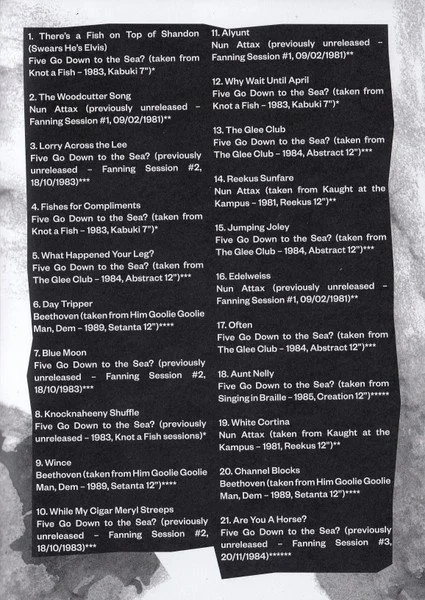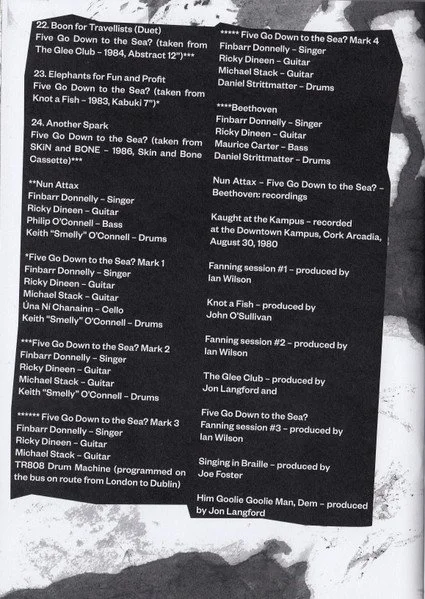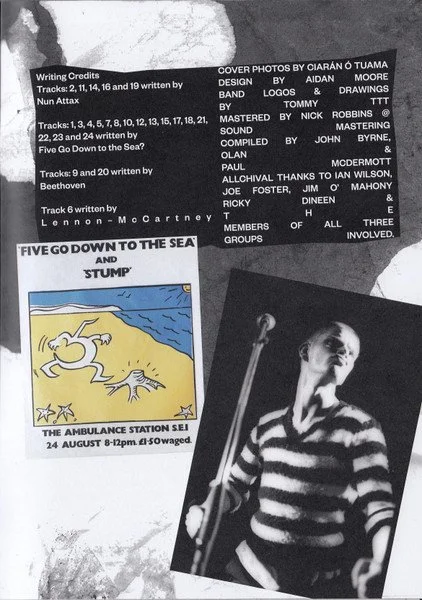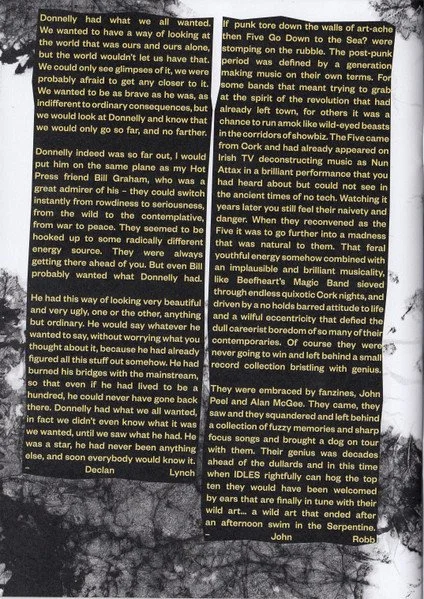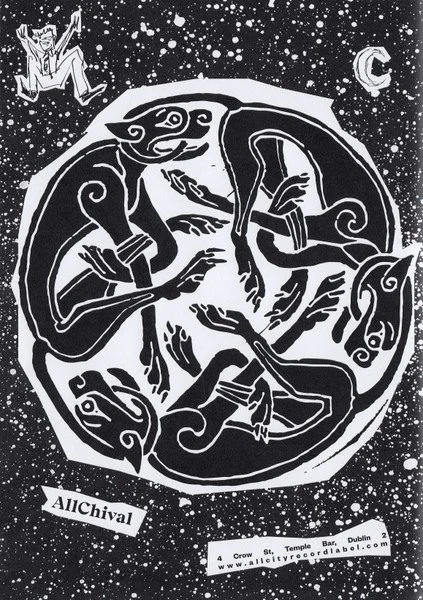
Hiding From the Landlord
Hiding From the Landlord - Nun Attax / Five Go Down to the Sea? / Beethoven (Allchival Records - 2020)
Compiled by John Byrne, Olan O’Brien and Paul McDermott
Sleevenotes by Paul McDermott and John Byrne
Cover photos by Ciarán Ó Tuama
Hiding From the Landlord
In April 2020 Allchival Records released Hiding From the Landlord, a compilation of Finbarr Donnelly’s trilogy of bands — Nun Attax, Five Go Down To The Sea? and Beethoven. Here are the sleevenotes that I wrote with John Byrne for the release.
In the Summer of 1978 Ricky Dineen starts playing the guitar with the O’Connell rhythm section brothers. Philip plays bass and his younger brother Keith plays drums. Keith is known as Smelly. Ricky works with Kevin Donnelly in The Fry Inn, a chipper on Shandon Street, one of the hills to Cork’s Northside. Kevin introduces Ricky to his brother Finbarr up The Glen, another Northside hill. The Donnellys, originally from Belfast, had moved to Cork a few years previously when Finbarr was around 12. Ricky and Finbarr bond over a shared interest in UFOs and music. Ricky’s listening habits are bands like Status Quo and Pink Floyd but Finbarr quickly introduces him to the world of John Peel and alternative music. Ricky immediately decides Finbarr looks like a singer. Walking down Assumption Road, another Northside hill, Ricky asks Donnelly to be the singer in the band he’s starting with Philip and Smelly. Ricky remembers, “There it was like, he was delighted with himself, [laughing] his vocation was there.” Donnelly calls up to Ricky’s house one night with pages and pages of lyrics. Ricky reckons this is the first and last time that Donnelly ever wrote down lyrics. He is asked to be the singer. In geography class one day Donnelly and a school friend Henry Condon are learning about glaciers. Nunatak, the name given to glacial islands resonates with them. Nunatak becomes Nun Attax. The band debut on yet another Northside hill, in Mayfield’s Community Hall, on Valentine’s night of 1979. They play ‘Pretty Vacant’ and ‘Teenage Kicks’ and a few of their own songs.
In early 1979 Mick Finnegan is asked to join on second guitar, ostensibly because he can play the solo to ‘Hotel California’. Finnegan, a traditional rock and roll guitarist, leaves after a few months, his head wrecked from the abuse, but recommends another guitarist as his replacement. Giordaí Ua Laoghaire joins the band in September 1979. He stays until May of the following year, but leaves for perhaps unusual “musical difference” issues. Giordaí’s reasons for leaving are simple: he wants more band practice, but no-one else does! He’s also tired of the constant abuse. When asked to describe the nature of this abuse, Giordaí laughs and says, “Just continuous abuse because I was from the country, all the time continuous abuse, so I eventually went over to the civilised Micro Disney camp, [laughing] where people would turn up for rehearsal.” Nun Attax continue without a second guitarist.
Elvera Butler, UCC’s Entertainment Officer, runs the Downtown Kampus at Cork’s Arcadia Ballroom and gives local bands support slots to touring UK and Irish bands. Nun Attax quickly become local heroes, and between April 1979 and February 1981 they play the Arc fifteen times to huge crowds — often in excess of 1,500 punters. In the Arc they play alongside U2, Virgin Prunes, The Cimarons and others. They also get to support UB40 on their four date Irish tour of October 1980. A few months prior to this, in August 1980, Nun Attax record a live EP with other local bands (Micro Disney, Mean Features and Urban Blitz). Kaught at the Kampus is released in February 1981 on Elvera’s new Reekus imprint. Side A of the EP is given over to Nun Attax and captures the band on blistering form. A few weeks earlier in issue №4 of Vox magazine Gavin Friday writes, “Nun Attax live leave me speechless, musically they are incomparable to anything I’ve ever heard.”
On the 9th of February 1981 Nun Attax head to Montrose in the leafy Dublin suburb of Donnybrook. Here they record a radio session for RTÉ, the national broadcaster, on the Dave Fanning Show. Philip O’Connell leaves around March and the band decide on a name-change. Ye know yerselves. The band is called Five Go Down to the Sea? after an unrecorded Nun Attax song. Ricky and Donnelly place a news snippet in issue №6 of Vox magazine looking for a bass player. “If you come from outside Cork, a job and flat can be arranged,” it confidently states. No bass player is willing to take up the kind offer, so Pat Kelleher formerly of Mean Features joins the all-new Five Go Down to the Sea? as a temporary measure only. The band withdraw for the summer to reorient things, and look for “a cellist and two violists” for the ranks.
Autumn 1981. Five see Úna Ní Chanainn playing cello in a play in the local college theatre — The Love of Don Perlimplín and Belisa in the Garden by Federico García Lorca. Mick Lynch of Mean Features plays the role of Don Perlimplín. Mick introduces Úna to the lads at the after party. She remembers that, “They were pretty drunk but persuasive and interesting to me, so I agreed to go along and rehearse with them.” One cellist, zero violists. Also found is string wizard Mick Stack. He is playing a gig with his band in the College Bar in UCC. Stack recalls that, “We were in the middle of a song when in walks Ricky, he just walks up to me and looking at my fingers says: That’s interesting.” Ricky invites him to join the lads for a practice. Stack transposes traditional mandolin skill into Five Go Down to the Sea? guitarring. Reoriented! Stack is from Ballyheigue in Co. Kerry, Úna is from the village of Gleann Maghair a few miles out of Cork. Ricky explains needlessly, “They’d be from completely different backgrounds to us.”
In late autumn 1982 recording sessions are underway for their Knot a Fish debut single. These take place in Greenfield studios, Headford Co. Galway and Sulán studios, Ballyvourney, Co. Cork. Úna finds Five live activity iniquitous to her Cello, and begins to focus more on her freelancing work with the RTÉ National Symphony Orchestra. She leaves in the winter of 1982.
In early 1983 the Knot a Fish 7” is unleashed on Kabuki Records. Five celebrate by getting out of Ireland for good — and into London instead. In late 1983 the lads discover a squat city south of the river. They invite whole sections of the Cork fraternity to join them in the old abandoned 1920s blocks of Rotherhithe. Stack remembers Rotherhithe being tough: “We’d eat stuff like pilchards and rabbit because it was cheap, we were all sleeping in one room with a cooking coil on its side for heat at night and upright during the day for boiling the kettle.” Sean O’Hagan remembers Donnelly and Ricky getting himself and Garreth Ryan of Kabuki Records a squat: “Within a few weeks I was down there living in this bizarre little oasis of madness in South-East London, it was almost like a bit of Cork had just been shipped over.”
The lads get work on building sites and Donnelly cooks for them. Donnelly’s week’s work involves collecting welfare under several different identities. The elaborate scam involves a timetable and getting to different welfare offices for a certain time each week — planning and effort are in profusion. On the 18th of October Five made their way back to Dublin to record another radio session for the Dave Fanning Show.
By 1984 the lads hook into the early Creation scene, and play gigs at Alan McGee’s Living Room club alongside The June Brides, Ut, Red Guitars, The Nightingales and The Three Johns. Leigh Goorney, Social Sec of Thames Poly is sympathetic to the cause and puts Five on the bill with The Mekons, The Men They Couldn’t Hang and Omega Tribe. The support band at one of Five’s gigs is a young band from East Kilbride called The Jesus and Mary Chain. Forty people witness the gig and a few weeks later the Mary Chain’s debut single changes Creation’s fortunes. Meanwhile under the watchful eye of Mekon Jon Langford The Glee Club sessions are captured in June. Langford, a fast friend of the Five, fondly remembers that, “We’d finish in the studio at six in the morning, and we’d go down to a pub where the meat workers go. We’d start drinking like it was a normal evening. They were hugely entertaining. I thought they were smart and really clever, they all had an amazing wit. A razor sharp, surreal fucking wit. It was like being within someone else’s world, they were their own family.” With The Glee Club, a classic emerges! Smelly celebrates by leaving the band and London.
Winter 1984. The band changes name — Five Go Down to the Drum Machine! Only messing, but on the 20th of November a third Fanning session is recorded back in Montrose for Irish radio; a wee rhythm-box taking Smelly’s place. Five do copious in person appearances with the Drum Machine. John Robb witnessed one of these gigs in Preston: “They turned up with just a drum machine. They couldn’t get the drum machine together in time with the guitars, so they just played along with this drum machine, with these ridiculous beats, pre-programmed beats all joined together and it was still amazing.” Stack reckons that, “Playing was very spotty, the balance would be bad or we’d just be off. On the odd occasion, when it would come together, we were the best band in the world, easy.”
In a Burger King the lads have a meeting with Alan McGee and Joe Foster. Creation agree to do a single, and Joe will produce it. McGee tells the lads that they’ll stage a few riots. Ricky goes, “For fuck sake, just release the record boy, will ya.” Swiss national Daniel Strittmatter joins on drums and Singing in Braille is recorded. Joe records the session and emphatically states that, “They were just absolutely unique they had something about them, you couldn’t put your finger on it, just complete disregard for structures of pop music.” The Singing in Braille 12” is released on Creation records in the summer of 1985. Stack leaves in December that year when the lads turn up to a gig langers. He recalls, “We all just beat the shit out of each other rolling in the mud and dirt. I was distraught afterwards because I knew it was over. That was the end. I went to America a day or two later.” The band limp on for another few months, and then a hiatus for a couple of turns.
Spring 1988. The band doesn’t just reactivate, but also changes name again — Ricky comes up with Beethoven and Donnelly changes it to Fuck Me Fuck My Beethoven. In February Fuck Me Fuck My Beethoven are added to the bill of an anti-censorship gig alongside The Dispossessed and Best Foot Forward. Absurdly the gig posters have to be censored and the band’s name is shortened to Beethoven. Donnelly, Ricky and Strittmatter are joined by Dublin bass player Maurice Carter. Keith Cullen offers to put out a record for the lads on his fledgling Setanta label. In the spring of 1989 Jon Langford is drafted in again to oversee the recording of Beethoven’s Him Goolie Goolie Man, Dem. On the 3rd of June Steven Wells awards the record “Single of the Week” in the NME declaring that: “The centrestone of this jewel of a record is the kidnapping, tarring and feathering, mugging, shagging and destruction of ‘Daytripper’.” Two weeks later on June 18th Finbarr and Ricky are hanging out with friends near the Serpentine, a small lake in London’s Hyde Park. Finbarr jumps into the lake for a swim, and in a mess-adventure he accidentally drowns.
Ricky remembers, “He swam halfway out and one of the lifeguards came over in a boat and told him to get out. Donnelly went under to come out the other side and just whatever happened below he got caught on some sort of reed or something like that and that was it like.” Donnelly’s body isn’t found until the following day. There couldn’t be any going on for the band without Finbarr, and Ricky returns to his hometown, where he lives to this day. Occasionally he brings together a band called And Nun Came Back to perform the music he and Finbarr created.
By Paul McDermott and John Byrne
(Quotations taken from the oral history “Get That Monster Off the Stage — the story of Finbarr Donnelly and his bands Nun Attax, Five Go Down to the Sea and Beethoven” by Paul McDermott)
Hiding From the Landlord, a compilation of Finbarr Donnelly’s trilogy of bands — Nun Attax, Five Go Down To The Sea? and Beethoven is available from Allchival Records.
© Paul McDermott and John Byrne 2020, All Rights Reserved
These sleevenotes were originally published in the 20 page A5 fanzine that accompanied Hiding From the Landlord. The fanzine also contains photographs, images of posters, cartoons and flyers, and writing about Donnelly and his trio of bands from: Kevin Barry, Conal Creedon, Cathal Coughlan, Elvera Butler, Gavin Friday, Úna Ní Chanainn, Janette Garthwaite, Pete Astor, Sally Timms, Declan Lynch, John Robb, Brian Moulton and Ricky Dineen. It can be viewed in the slideshow below:

